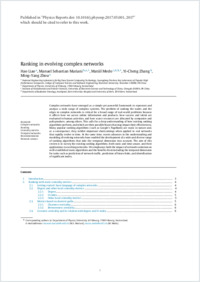Ranking in evolving complex networks
- Liao, Hao National Engineering Laboratory for Big Data System, Shenzhen University, China
- Mariani, Manuel Sebastian Department of Physics, University of Fribourg, Switzerland - National Engineering Laboratory for Big Data System, Shenzhen University, China
- Medo, Matúš Institute of Fundamental and Frontier Sciences, Chengdu, China - Department of Radiation Oncology, Inselspital, Bern University Hospital, Bern, Switzerland - Department of Physics, University of Fribourg, Switzerland
- Zhang, Yi-Cheng Department of Physics, University of Fribourg, Switzerland
- Zhou, Ming-Yang National Engineering Laboratory for Big Data System, Shenzhen University, China
-
19.05.2017
Published in:
- Physics Reports. - 2017, vol. 689, p. 1–54
English
Complex networks have emerged as a simple yet powerful framework to represent and analyze a wide range of complex systems. The problem of ranking the nodes and the edges in complex networks is critical for a broad range of real-world problems because it affects how we access online information and products, how success and talent are evaluated in human activities, and how scarce resources are allocated by companies and policymakers, among others. This calls for a deep understanding of how existing ranking algorithms perform, and which are their possible biases that may impair their effectiveness. Many popular ranking algorithms (such as Google’s PageRank) are static in nature and, as a consequence, they exhibit important shortcomings when applied to real networks that rapidly evolve in time. At the same time, recent advances in the understanding and modeling of evolving networks have enabled the development of a wide and diverse range of ranking algorithms that take the temporal dimension into account. The aim of this review is to survey the existing ranking algorithms, both static and time-aware, and their applications to evolving networks. We emphasize both the impact of network evolution on well-established static algorithms and the benefits from including the temporal dimension for tasks such as prediction of network traffic, prediction of future links, and identification of significant nodes.
- Faculty
- Faculté des sciences et de médecine
- Department
- Département de Physique
- Language
-
- English
- Classification
- Physics
- License
-
License undefined
- Identifiers
-
- RERO DOC 306790
- DOI 10.1016/j.physrep.2017.05.001
- Persistent URL
- https://folia.unifr.ch/unifr/documents/306299
Statistics
Document views: 142
File downloads:
- pdf: 554
